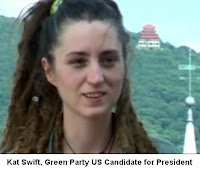 Kat Swift:
Kat Swift:http://www.youtube.com/watch?v=ZB7f-XHsJD8
 Kent Mesplay:
Kent Mesplay:http://www.youtube.com/watch?v=BB0exE5kssI
 Jesse Johnson:
Jesse Johnson:http://www.youtube.com/watch?v=xcXF4AHcVbs
Think of it as a super early sneak preview to the film "Seriously Green" which is currently being filmed by Polidoc Productions.
-------------
Disputed election results, Democrat and Republican fueled animosity and gridlock have created a call for change in American politics. Can the Greens survive their own internal struggles to be the party of influence in 2008?
As the Democratic and the Republican campaigns play out on the national stage, another campaign is taking shape more quietly, with little news coverage and decidedly more grassroots fanfare. Fortified by some local wins and growing public awareness about environmental issues, the Greens are hopeful that 2008 will bring their party into the spotlight as a real player in the body politic.
Their goals are lofty -- to present the Green Party as a viable alternative to politics as usual; to broaden their base by becoming the party of choice for progressives, environmentalists, and pacifists; and to change America's political process.
To do this, they must do three things: attract media attention; gain access on all state ballots; and nominate a dynamic candidate -- one who can change the American public's impression of the Greens from "spoilers" into "reformers".
Mainstream media focuses on the candidates with the most dollars, placing the biggest earners dead center on stage during debates with financially struggling candidates pushed into the wings. In a system fueled significantly by corporate-backed agendas, Republicans and Democrats enjoy a huge financial advantage over the Greens, who accept no corporate money. Will the rise of new media allow the Greens to sit at the table and expand the discourse?
All third parties fight for ballot access in each state and along the way, face a barrage of lawsuits sponsored by one of the two major parties. These lawsuits are designed to threaten ballot access and drain party resources. These anticipated battles are forging unlikely alliances, between Libertarian, Green and Independent parties who have joined to fight for ballot access, as in Minnesota.
Depending upon whom the Greens nominate for their candidate, the party may be facing political life or death. Despite questions concerning the best use of their resources, the Greens resolved in 2007 to run a candidate for President. The crucial question is whether they select a candidate with national stature or a grass- roots candidate familiar with the party's vision and values. Each path has potential rewards and liabilities.
The backlash from Ralph Nader's 2000 run hit the Greens with a declining membership, the title of "spoiler" and a strategic crisis. While the Greens have defended their choice since 2000, in 2004 Nader ran as an Independent and the Greens nominated one of their own, David Cobb.
This year, Nader and former US Congresswoman Cynthia McKinney have spoken at Green Party meetings and the National Convention in 2007 but have not declared their intentions. A Nader or McKinney candidacy will spark more media coverage and potentially help the Greens capture the tantalizing goal of 5 per cent of the vote, particularly if McKinney energizes the untapped Hip-Hop community. Five percent of the vote will qualify Green candidates for Federal funds for their campaigns -- a huge step forward. But these funds come at a price. A Republican victory that can be blamed on the Greens leaves the party further from their political goals of peace and environmental sustainability and could once again alienate the Greens from their natural allies and progressive voters.
Currently, seven candidates are actively seeking the Green Party's nomination for President. Some have run for local and state office, but none are household names. Some are loyal members of the party who can quote the 10 key values while others claim to be "Green at heart". Some may be looking for a party to back their pipe dream. They are ordinary citizens that contend that if the country votes Green, they will make fundamental changes. If Nader or McKinney decline to step up to the plate, one of these political rookies may be running for President of the United States.
In 2008 the Green Party values may finally resonate with American voters ready to revise energy policy and environmental laws, promote universal health care and an end to the war in Iraq. But will the voters recognize these values as Green? Will they hear the Green Party's message at all? And if so, will voters be Green on their ballots as well as in their hearts? Stay tuned.

No comments:
Post a Comment